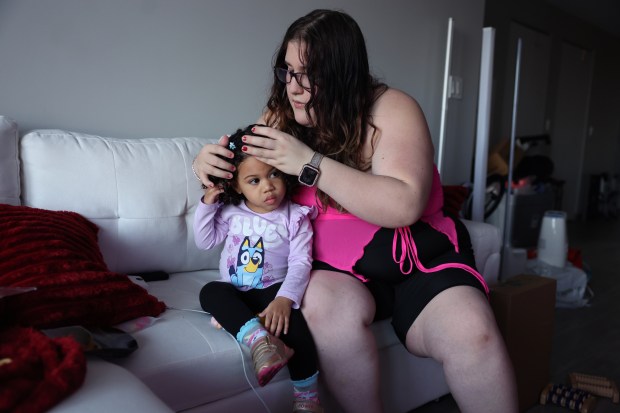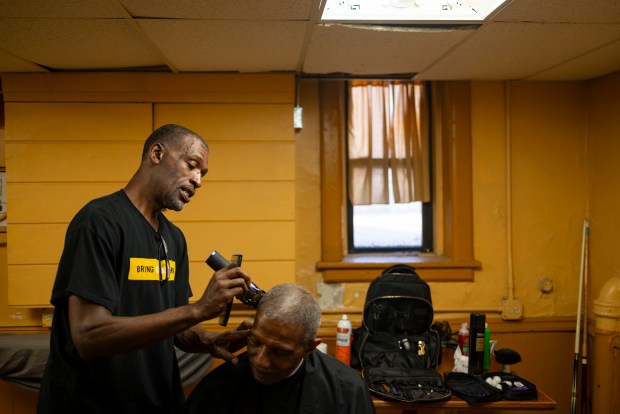Brian Rodgers, 50, had a typical upbringing, growing up with a working mother and grandmother who he said gave him everything he needed to succeed. But along the way, his values got misaligned from what he was taught. That landed him in jail many times.
“If you add all of my time out, which has been in and out, I never spent more than nine months on the street in the last 15 years,” he said. “I got out in 2023. Every time I got incarcerated and got back out, there was no place for me to live. I didn’t have a home. I had to go either to a friend’s place, couch surf, or a shelter, which I didn’t want to stay in.”
For Kimberly Riquelme, 21, getting pregnant while attending college in Kankakee changed her life’s trajectory. She had been studying nursing but decided to pivot when her daughter Jasmine came into the world. Although her family was watching her baby in Ohio while she was in school, Riquelme said she wasn’t doing well in classes because she didn’t want to be away from her newborn.
Campus housing proved elusive at the time for the single mom. And the idea of moving back to Dayton to an already crowded residence with family members wasn’t something she wanted to do. Despite having an associate’s degree in biology, Riquelme became unhoused on April 14, 2023, with her daughter in tow and sleeping in her car when necessary. Juggling raising a child with her own mental health challenges, she said she lived in a space of “nonstop adrenaline.”
“I had to be on my toes with everything, every single day … always be at a peak to make sure that we’re both OK,” she said. “Having a kid on the streets is really scary. It’s really hard just trying to get through it, find food and be able to have a safe place to stay.”
Rodgers and Riquelme’s stories are two of five showcased in the new season of “Firsthand: Homeless,” a digital documentary series on WTTW. The series has looked at some big issues facing Chicago and Illinois, from segregation to poverty and gun violence. Their experiences shed a light on the city’s growing unhoused population. The sixth season launched Monday.
“Over the course of the coming year, WTTW will document and share the hopes and challenges of people across Chicago’s communities who are experiencing or facing homelessness,” said Sandra Cordova Micek, president and CEO of WTTW. “Through documentary storytelling, news reporting and community engagement, ‘Firsthand: Homeless’ will demonstrate WTTW’s purpose, mission and values as a community-focused, public service media organization.”
A perfect storm of events changed Rodgers’ trajectory from the idyllic life he had known growing up in the South Shore neighborhood, including losing his job and his mother getting a lupus diagnosis. The pressures of trying to maintain or find other jobs caused him to chase the wrong things.
Because of substance abuse and the traumatic loss of his mom, he started stealing, which led to incarceration. “I was in a revolving door in my mental state,” he said.
Riquelme said folks clash in the shelters because there are so many people with different personalities and backgrounds coming in to get help.
“You get people who’ve been homeless for years compared to someone like me, and someone who’s really aggressive to somebody who’s very quiet,” she said. “It kind of feels like high school. Everybody knows everybody. … If something bad does happen in a shelter, then you have to cut off all of the resources you may have had until things roll over; that’s not possible when you’re homeless and struggling.”
According to the nonprofit Chicago Coalition for the Homeless, nearly 68,500 Chicagoans are experiencing homelessness. That includes people who are living in homes with family and friends.
WTTW’s “Homeless” initiative includes yearlong community discussions and screenings around housing insecurity throughout the city and state in partnership with the Night Ministry, the All Chicago nonprofit and the Chicago Public Library. Community leaders offer reflections, ideas and solutions for addressing the challenges and opportunities facing the population and events around the state will engage residents and policymakers in dialogue to explore ways to effect positive change. WTTW will publish and distribute a discussion guide to supplement the project, providing direction and prompts for discussion across communities.
Since filming the documentary last year, Riquelme landed a two-bedroom apartment in the Lincoln Park neighborhood. She’s been in the space less than a month, but already says it’s the nicest thing she’s ever had. She’s grateful because she’s had some frightening experiences on the street, including having a knife pulled on her and her child while waiting for a bus and enduring stays in shelters that she felt were not safe.
Riquelme continues to speak out about the unhoused to whomever will listen. “A closed mouth doesn’t get fed,” she said.

“We’re just asking for shelter and food, things people should have,” she said. “It’s not like we asked to be homeless. I know friends who were in an abusive relationship and they had to leave and that’s how they became homeless, or something happened and they didn’t have enough money and now they’re homeless. It can happen to anybody. There’s a lot of moms out there who are homeless and living in shelters. It’s really disheartening to realize there’s not a lot of shelters out there for moms with kids, only limited options, and if those options aren’t available, then you’re really kind of screwed.”
Sober for several years now, Rodgers is living at Saint Andrews Court, a transitional facility in East Garfield Park for the formerly incarcerated. He is working with the Chicago Coalition for the Homeless as an outreach assistant, getting the word out on the Bring Chicago Home campaign — a measure on the ballot in March that aims to bring a tiered increase in the tax rate buyers pay on property sales over $1 million. If brought to fruition, the money would provide permanent affordable housing and other services for the unhoused.
Since starting his position, Rodgers says more people are hearing about the plight of the unhoused.
“They can’t be oblivious, because it’s everywhere. … It’s in every community in the city of Chicago,” he said. “It used to be a time where you could kind of place a label and say, ‘Hey, the homeless people live on Lower Wacker Drive. Those days are long gone. And this is why I say, ‘Don’t think that this can’t happen to you.’”
Rodgers hopes to be living in his own apartment by the summer. He’s looking for somewhere safe and clean. He likes clean bathrooms and kitchens. In the next five years, he wants to be working on another type of social justice issue, “something that can move us forward and together in a promising way, something that’s going to benefit everyone as a whole.”
“We have a duty to impart what we know and what we have to those who do not know and have,” Rodgers said. “It’s not to say I’m gonna write a blank check and hand it to you, but what it is saying is you’re not forgotten about either, because you’re human too.”



